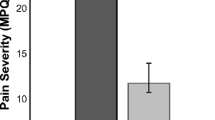Abstract
Objectives
Previous studies have shown that brief mindfulness trainings can have significant analgesic effects. However, the effects of the various components of mindfulness on pain analgesia are not well understood. The objective of this study was to examine the effects of two components of mindfulness interventions—attention and acceptance—on pain analgesia.
Methods
One hundred and nineteen healthy college students without prior mindfulness experience underwent a cold-pressor test to measure pain tolerance before and after the training. Pain intensity, tolerance, distress, threshold, and endurance time were also tested. The participants were randomly assigned to one of the following four conditions: (1) acceptance of pain, (2) attention to pain, (3) acceptance of and attention to pain, or (4) control.
Results
The results showed that both the acceptance strategy and the combined acceptance and attention group increased pain endurance and tolerance after training. Furthermore, the acceptance group had longer pain endurance and tolerance times than the attention and control groups.
Conclusions
These results suggest that acceptance of pain is more important than attention to pain. Study limitations and future research directions are discussed.


Similar content being viewed by others
References
Baer, R. A. (2009). Self-focused attention and mechanisms of change in mindfulness-based treatment. Cognitive Behaviour Therapy, 38(Suppl 1), 15–20. https://doi.org/10.1080/16506070902980703.
Bishop, S. R., Lau, M., Shapiro, S., Carlson, L., Anderson, N. D., Carmody, J., et al. (2004). Mindfulness: a proposed operational definition. Clinical Psychology: Science and Practice, 11(3), 230–241. https://doi.org/10.1093/clipsy.bph077.
Bohlmeijer, E., Prenger, R., Taal, E., & Cuijpers, P. (2010). The effects of mindfulness-based stress reduction therapy on mental health of adults with a chronic medical disease: a meta-analysis. Journal of Psychosomatic Research, 68(6), 539–544. https://doi.org/10.1016/j.jpsychores.2009.10.005.
Branstetter-Rost, A., Cushing, C., & Douleh, T. (2009). Personal values and pain tolerance: does a values intervention add to acceptance? The Journal of Pain, 10(8), 887–892. https://doi.org/10.1016/j.jpain.2009.01.001.
Faul, F., Erdfelder, E., Lang, A. G., & Buchner, A. (2007). G*Power 3: a flexible statistical power analysis program for the social, behavioral, and biomedical sciences. Behavior Research Methods, 39(2), 175–191. https://doi.org/10.3758/bf03193146.
Feldner, M. T., Hekmat, H., Zvolensky, M. J., Vowles, K. E., Secrist, Z., & Leen-Feldner, E. W. (2006). The role of experiential avoidance in acute pain tolerance: a laboratory test. Journal of Behavior Therapy and Experimental Psychiatry, 37(2), 146–158. https://doi.org/10.1016/j.jbtep.2005.03.002.
Forsyth, L., & Hayes, L. L. (2014). The effects of acceptance of thoughts, mindful awareness of breathing, and spontaneous coping on an experimentally induced pain task. The Psychological Record, 64(3), 447–455. https://doi.org/10.1007/s40732-014-0010-6.
Frewen, P. A., Evans, E. M., Maraj, N., Dozois, D. J. A., & Partridge, K. (2007). Letting go: mindfulness and negative automatic thinking. Cognitive Therapy and Research, 32(6), 758–774. https://doi.org/10.1007/s10608-007-9142-1.
Frewen, P. A., Lundberg, E., MacKinley, J., & Wrath, A. (2011). Assessment of response to mindfulness meditation: meditation breath attention scores in association with subjective measures of state and trait mindfulness and difficulty letting go of depressive cognition. Mindfulness, 2(4), 254–269. https://doi.org/10.1007/s12671-011-0069-y.
Gao, L., Curtiss, J., Liu, X., & Hofmann, S. (2018). Differential treatment mechanisms in mindfulness meditation and progressive muscle relaxation. Mindfulness, 9(4), 1268–1279.
Grant, J. A. (2014). Meditative analgesia: the current state of the field. Annals of the New York Academy of Sciences, 1307, 55–63. https://doi.org/10.1111/nyas.12282.
Grant, J. A., & Rainville, P. (2009). Pain sensitivity and analgesic effects of mindful states in Zen meditators: a cross-sectional study. Psychosomatic Medicine, 71(1), 106–114. https://doi.org/10.1097/PSY.0b013e31818f52ee.
Gutiérrez, O., Luciano, C., Rodríguez, M., & Fink, B. C. (2004). Comparison between an acceptance-based and a cognitive-control-based protocol for coping with pain. Behavior Therapy, 35(4), 767–783.
Hayes, S. C., Strosahl, K. D., & Wilson, K. G. (1999). Acceptance and commitment therapy. New York: The Guilford Press.
Kabat-Zinn, J. (2003). Mindfulness-based interventions in context: past, present, and future. Clinical Psychology: Science and Practice, 10(2), 144–156. https://doi.org/10.1093/clipsy.bpg016.
Keogh, E., Bond, F. W., Hanmer, R., & Tilston, J. (2005). Comparing acceptance- and control-based coping instructions on the cold-pressor pain experiences of healthy men and women. European Journal of Pain, 9(5), 591–598. https://doi.org/10.1016/j.ejpain.2004.12.005.
Kingston, J., Chadwick, P., Meron, D., & Skinner, T. C. (2007). A pilot randomized control trial investigating the effect of mindfulness practice on pain tolerance, psychological well-being, and physiological activity. Journal of Psychosomatic Research, 62(3), 297–300. https://doi.org/10.1016/j.jpsychores.2006.10.007.
Kohl, A., Rief, W., & Glombiewski, J. A. (2012). How effective are acceptance strategies? A meta-analytic review of experimental results. Journal of Behavior Therapy and Experimental Psychiatry, 43(4), 988–1001. https://doi.org/10.1016/j.jbtep.2012.03.004.
Kohl, A., Rief, W., & Glombiewski, J. A. (2013). Acceptance, cognitive restructuring, and distraction as coping strategies for acute pain. Journal of Pain, 14(3), 305–315. https://doi.org/10.1016/j.jpain.2012.12.005.
Lindsay, E. K., & Creswell, J. D. (2017). Mechanisms of mindfulness training: monitor and acceptance theory (MAT). Clinical Psychology Review, 51, 48–59. https://doi.org/10.1016/j.cpr.2016.10.011.
Liu, X., Wang, S., Chang, S., Chen, W., & Si, M. (2013). Effect of brief mindfulness intervention on tolerance and distress of pain induced by cold-pressor task. Stress and Health, 29(3), 199–204. https://doi.org/10.1002/smi.2446.
Masedo, A. I., & Esteve, M. R. (2007). Effects of suppression, acceptance and spontaneous coping on pain tolerance, pain intensity and distress. Behaviour Research and Therapy, 45(2), 199–209. https://doi.org/10.1016/j.brat.2006.02.006.
McCaul, K. D., & Haugtvedt, C. (1982). Attention, distraction, and cold-pressor pain. Journal of Personality and Social Psychology, 43(1), 154–162. https://doi.org/10.1037/0022-3514.43.1.154.
McCracken, L. M., Vowles, K. E., & Eccleston, C. (2005). Acceptance-based treatment for persons with complex, long standing chronic pain: a preliminary analysis of treatment outcome in comparison to a waiting phase. Behaviour Research and Therapy, 43(10), 1335–1346. https://doi.org/10.1016/j.brat.2004.10.003.
McMullen, J., Barnes-Holmes, D., Barnes-Holmes, Y., Stewart, I., Luciano, C., & Cochrane, A. (2008). Acceptance versus distraction: brief instructions, metaphors and exercises in increasing tolerance for self-delivered electric shocks. Behaviour Research and Therapy, 46(1), 122–129. https://doi.org/10.1016/j.brat.2007.09.002.
Mitchell, L. A., MacDonald, R. A., & Brodie, E. E. (2004). Temperature and the cold pressor test. Journal of Pain, 5(4), 233–237. https://doi.org/10.1016/j.jpain.2004.03.004.
Roche, B., Forsyth, J. P., & Maher, E. (2007). The impact of demand characteristics on brief acceptance- and control-based interventions for pain tolerance. Cognitive and Behavioral Practice, 14(4), 381–393. https://doi.org/10.1016/j.cbpra.2006.10.010.
Veehof, M. M., Oskam, M. J., Schreurs, K. M., & Bohlmeijer, E. T. (2011). Acceptance-based interventions for the treatment of chronic pain: a systematic review and meta-analysis. Pain, 152(3), 533–542. https://doi.org/10.1016/j.pain.2010.11.002.
Wang, Y., Xu, W., Zhuang, C., & Liu, X. (2017). Does mind wandering mediate the association between mindfulness and negative mood? A preliminary study. Psychological Reports, 120(1), 118–129. https://doi.org/10.1177/0033294116686036.
Zeidan, F., & Vago, D. R. (2016). Mindfulness meditation-based pain relief: a mechanistic account. Annals of the New York Academy of Sciences, 1373(1), 114–127. https://doi.org/10.1111/nyas.13153.
Zeidan, F., Gordon, N. S., Merchant, J., & Goolkasian, P. (2010). The effects of brief mindfulness meditation training on experimentally induced pain. Journal of Pain, 11(3), 199–209. https://doi.org/10.1016/j.jpain.2009.07.015.
Zeidan, F., Grant, J. A., Brown, C. A., McHaffie, J. G., & Coghill, R. C. (2012). Mindfulness meditation-related pain relief: evidence for unique brain mechanisms in the regulation of pain. Neuroscience Letters, 520(2), 165–173. https://doi.org/10.1016/j.neulet.2012.03.082.
Acknowledgements
The authors thank Johann D’Souza for the proof-reading work.
Funding Sources
This research was supported by the National Science Foundation of China (Project 31271114). Dr. Hofmann receives financial support from the Alexander von Humboldt Foundation (as part of the Humboldt Prize), NIH/NCCIH (R01AT007257), NIH/NIMH (R01MH099021, U01MH108168), and the James S. McDonnell Foundation 21st Century Science Initiative in Understanding Human Cognition – Special Initiative. He receives compensation for his work as an advisor from the Palo Alto Health Sciences and for his work as a Subject Matter Expert from John Wiley & Sons, Inc. and SilverCloud Health, Inc. He also receives royalties and payments for his editorial work from various publishers.
Author information
Authors and Affiliations
Contributions
WY and LX conceived and designed the study, executed the study, analyzed the data, and wrote the paper. QZ collaborated with the collection of the data. SH, SM, and XW collaborated in the writing and editing of the final manuscript. All the authors approved the final version of the manuscript for submission.
Corresponding author
Ethics declarations
Conflict of Interest
The authors declare no conflict of interest.
Ethics Statement
The study received ethical approval from the Academic Committee of College of Psychology, Capital Normal University. No adverse events were reported in this study.
Informed Consent
Informed consent was obtained from all individual participants.
Additional information
Publisher’s Note
Springer Nature remains neutral with regard to jurisdictional claims in published maps and institutional affiliations.
Electronic supplementary material
ESM 1
(DOCX 19 kb)
Rights and permissions
About this article
Cite this article
Wang, Y., Qi, Z., Hofmann, S.G. et al. Effect of Acceptance Versus Attention on Pain Tolerance: Dissecting Two Components of Mindfulness. Mindfulness 10, 1352–1359 (2019). https://doi.org/10.1007/s12671-019-1091-8
Published:
Issue Date:
DOI: https://doi.org/10.1007/s12671-019-1091-8




